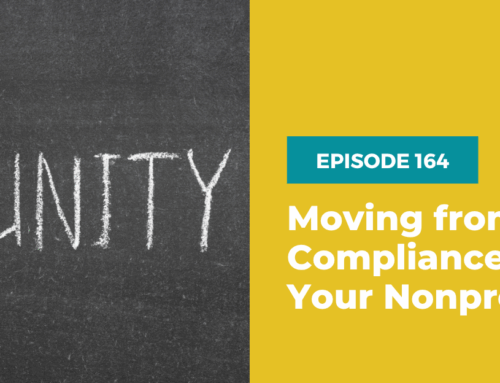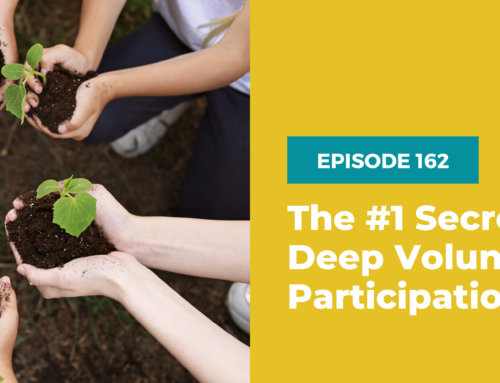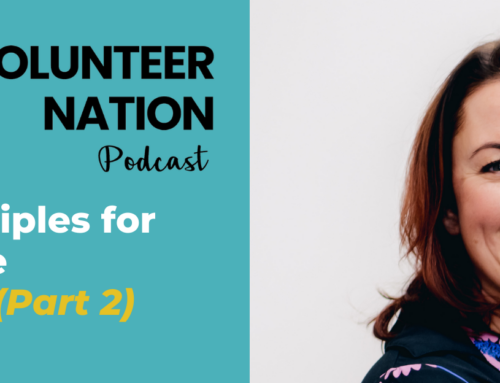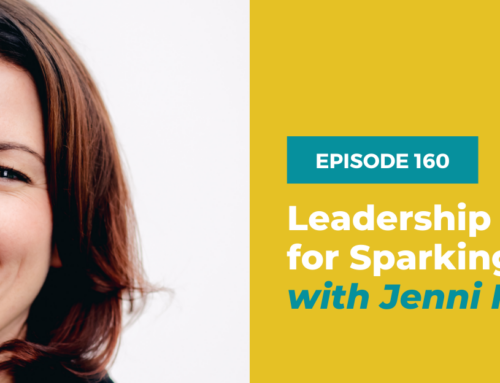 Inclusive Volunteerism: What You Can Do Right Now to Be A Better Champion
Inclusive Volunteerism: What You Can Do Right Now to Be A Better Champion
As a leader, the work of promoting more inclusive volunteerism may feel like the right thing to do. It also might feel overwhelming and scary.
You might wonder if you are the right person to lead such an effort. You may distrust your organization’s ability actually embrace the real changes needed. You may worry that you will set others up to fail or cause more harm than good. You may be discouraged by past attempts that didn’t go as well as you hoped. You may wonder how you can add one more initiative to an already overflowing plate.
Now imagine the flip side.
What if, despite all of your fears and anxieties of failure and judgment, you moved forward anyway? What if you took concrete action steps to building bridges to better volunteer diversity, equity, and inclusion? What if you didn’t wait for permission from above, but rather started with your own area of responsibility – your own mindset and the culture of your team, however small? And, what if you became a beacon of light for others to follow that could make volunteering a more meaningful place for volunteers from all walks of life?
You may question your own abilities to facilitate a difficult organizational transformation, fraught with potential conflict.
But I can assure you that you can inspire change with your individual and collective action. And as a leader of volunteers, you have not only the right, but the responsibility to do so.
If you are a white leader, with little experience in racial justice work, you may doubt whether your efforts will be welcome.
But some argue that the burden for change should rest solidly on the shoulders of those who have enjoyed, willingly or not and regardless of economic status, benefits and advantages not part of the lived experience of many people of color.
Wondering what these privileges may be or how racism might work in your favor? If you’re ready for an a-ha! moment, read this essay and try out the exercise at the bottom from Showing Up for Racial Justice (SURJ).
Regardless of your political or ideological beliefs, or your theory of racism, as a leader who relies on the success of working with and in communities, the current context can have real impact on your work, positive or negative.
And, you get to decide how you show up. And, if you seek to make change, you’ve got back up.
Global Support for Inclusive Volunteerism

Around the world, the concepts of fair, just, and inclusive environments for volunteers have been the aspirational norm for our profession for some time.
The International Association for Volunteer Effort (IAVE) Universal Declaration on Volunteering states the following …
This Declaration supports the right of every woman, man and child to associate freely and to volunteer regardless of their cultural and ethnic origin, religion, age, gender, and physical, social or economic condition. All people in the world should have the right to freely offer their time, talent, and energy to others and to their communities through individual and collective action, without expectation of financial reward.
We seek the development of volunteering that:
- elicits the involvement of the entire community in identifying and addressing its problems;
- encourages and enables youth to make leadership through service a continuing part of their lives;
- provides a voice for those who cannot speak for themselves;
- enables others to participate as volunteers;
- complements but does not substitute for responsible action by other sectors and the efforts of paid workers;
- enables people to acquire new knowledge and skills and to fully develop their personal potential, self-reliance and creativity;
- promotes family, community, national and global solidarity.
We believe that volunteers and the organizations and communities that they serve have a shared responsibility to:
- create environments in which volunteers have meaningful work that helps to achieve agreed upon results;
- define the criteria for volunteer participation, including the conditions under which the organization and the volunteer may end their commitment, and develop policies to guide volunteer activity;
- provide appropriate protections against risks for volunteers and those they serve:
- provide volunteers with appropriate training, regular evaluation, and recognition;
- ensure access for all by removing physical, economic, social, and cultural barriers to their participation.
In addition, the global Council for Certification in Volunteer Administration (CCVA) also emphasizes inclusive volunteerism in its guidance around Professional Ethics in Volunteer Administration. They explain …
This document presents the five core values and related principles for ethical practice in volunteer administration. Adherence to these ethical values is critical to sustaining organizations that:
- are accessible to diverse groups
- operate ethically with all stakeholders
- strive for excellence
- maintain the public trust
- sustain a helping environment
- are at low risk for legal actions against them
The CCVA’s Core Values and Principles include the following …
CITIZENSHIP: The Administrator of Volunteers understands that volunteerism is a foundation of civil societies and guides the organization and its stakeholders toward active community participation.
- Dignity: Act in a compassionate manner that upholds the right of all volunteers to be valued and involved in decisions that affect them.
- Inclusivity: Encourage and facilitate the participation of individuals from diverse backgrounds, perspectives and abilities.
- Privacy: Protect the privacy of individuals and information considered confidential.
RESPECT: The Administrator of Volunteers acknowledges the inherent value, skills and abilities of all individuals and affirms the mutual benefit gained by the volunteer and the organization.
- Collaboration: Include stakeholders in the development and support of volunteer engagement and cultivate partnerships to enhance the impact of volunteers.
- Continuous Improvement: Pursue excellence by enhancing professional competence, maintaining certifications and fostering innovation.
- Professionalism: Provide outstanding service to the organization and the people it serves while upholding personal and professional boundaries in all interactions.
ACCOUNTABILITY: The Administrator of Volunteers demonstrates responsibility to the organization, its stakeholders and the profession of volunteer administration.
- Impartiality: Remain unbiased and objective when working with stakeholders.
- Equity: Ensure access to opportunities, resources and support which enable volunteers to be successful.
- Justice: Implement open and consistent processes that inform decision‐making and address discriminatory or prejudicial behaviors.
FAIRNESS: The Administrator of Volunteers commits to individual and collective efforts that build and support a fair and just organizational culture.
- Honesty: Commit to the truth and strive for transparency.
- Integrity: Demonstrate consistency between word and action by practicing ethical decision‐making and addressing conflicts of interest.
- Commitment: Act in a forthright manner with sincere good intent and follow through on promises and agreements.
Embedded in both IAVE and CCVA’s statements of vision and values include many ideas that apply to this moment in time and have particular power when viewed through the lens of systemic institutional racism.
The question is – Have these ideals been embraced by organizations that engage volunteers? And, if so, to what extent? And, what work is left to do to ensure that all volunteers are welcomed and treated fairly and equitably?
Toward Inclusive Volunteerism: Eight First Steps

In addition to ethical values, many have argued that calling out racism is a key to our individual and collective well-being, growth, and ultimately to the sustainability of our organizations.
Take a moment to imagine a vibrant, diverse group of volunteers, from all walks of life, deeply engaged in your mission and moving forward together with inspired purpose. Imagine a space where mutual respect and compassion is the norm, where each and every person who commits to service feels valued for their contributions and feels no need to prove themselves in the eyes of others (and yes, many volunteers of color currently feel this way). Imagine what it would be like to build lasting relationships of trust with communities you have yet to reach with the support of volunteer leaders.
This is possible.
But it takes action.
Here are eight specific steps to begin to work through your fear and doubt and start making progress …
- It Starts with You – If you’re not sure about the hidden, and often unconscious biases you hold, try out the free Project Implicit test to check for attitudes and stereotypes you may not be aware of. One major benefit of taking the test is that you immediately realize that implicit biases are part of regular life, and it will take some mindful attention to recognize and address them when they arise.
- Expect to Make Mistakes – Like any other skill or challenging endeavor, leading the way for more inclusive volunteerism will take time to master. What’s more, others may not agree with your approach, theoretically or practically. Your resilience and courage will be the key to your success, and the reality is that it may feel like trial be fire.
- Work Collectively – There’s nothing more powerful for dismantling bias than to include multiple perspectives in the planning and implementation of the work. By its very nature, adding diverse voices and points of view can dilute, or call into question, the dominant view. This requires a thoughtful group process that does not oppress its members.
- Gather Insights from Others – There is so much amazing thought work going on right now around diversity, equity, and inclusion. Books, resources, toolkits, courses, and advice abound, so, get started with one item and commit to continuous learnings that you feel up to date. Learning is a process not a destination, so simply keep moving forward. This 21-Day Equity Challenge makes it super easy.
- Lean into Critique – If you are able to create a context for real, authentic communication to occur, emotions may run high and defensiveness will naturally crop up. In many families and cultures, interpersonal conflict is viewed as distasteful, anxiety provoking, and even dangerous. It may also trigger feelings of exclusion. As a leader, you will need to lead by example and hold space for conflict while, at the same time, showing compassion and willingness to stay fully attuned. One clear way to do this is to simply ask “Can you tell me more?” when someone raises and issue. Then, be willing to adjust based on their input when it makes sense.
- Recognize the System at Work – While there are steps we can each take as individuals, it’s also important to name the systemic polices and actions sanctioned by organizations and the sector that are oppressive. Whenever a power dynamic exists, there is a possibility for oppression to occur. Ask the tough questions with compassion and focus. Be that person who isn’t afraid to speak up for a better world.
- Take Time Out for Fun – Anti-discrimination work is serious business, but the work to build alliances through trusting relationships can be fun, too. Make time for simple social activities. Socializing helps break down barriers as those involved share common interests, they may not yet have previously been aware of. When we see ourselves in the Other, we sow the seeds of trust.
- Give Yourself Some Grace – Finally, take some personal time to reflect and grow your own understanding as it evolves. You will need quiet, meditative moments to fully examine your own thoughts and feelings so that you can respond wisely when its needed. To remain resilient through the journey ahead you will need to take time for rest, too.
There’s no doubt that we are in an exhausting time. The political upheavals and Coronavirus pandemic have no doubt made things harder for most of us.
At the same time, it’s also true that some of us have suffered more than others and have done so for generations.
It’s time to acknowledge and work against systemic racism in volunteer organizations. This goes far beyond simply diversifying the composition of volunteer teams.
This is about ensuring that all people who wish to serve are able to do so without feeling devalued, dehumanized, and disempowered.
We have a responsibility as leaders of volunteers to be vigilant and respectful guardians of equity.
If you set policy – or make any decisions whatsoever – around how volunteers are treated, you are in a position to start change, regardless of your positional power or job title.
You can do this.
Inclusive Volunteerism: What’s Missing?

These are only a few steps that I’ve found helpful in my own journey.
What resources, recommendations, and action items do you suggest be added or changed on this list? What have I missed? What needs greater illumination?
I look forward to your comments below.
[MASTERCLASS] Diversity, Equity, and Inclusion for Volunteer-Driven Organizations
with Dr. Matthew C. Whitaker
Learn how you can better champion diversity, equity, inclusion, and cultural adaptability efforts for your volunteer initiatives in this two-part online series.
PART 1 – Understanding Diversity, Equity, Inclusion and Disrupting Implicit Bias
September 15, 2020
3:00PM-4:00PM EST / 12:00-1:00PM PST
PART 2 – Managing and Operationalizing DEI in Volunteering
October 20, 2020
3:00PM-4:00PM EST / 12:00-1:00PM PST
Note: This training is FREE for VolunteerPro members (please register inside the community)
$69 with EARLY BIRD DISCOUNT
Use the coupon code BETTERTOGETHER at checkout.
Expires: Sept 3 at 11:59pm EST







Leave A Comment